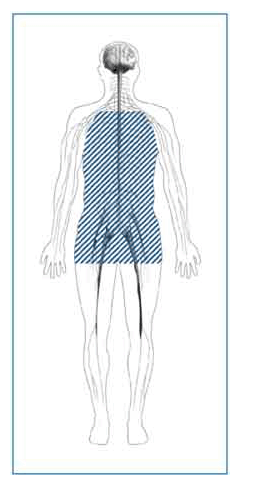| |
Diabetic & HIV Neuropathy
|
| |
| |
What is autonomic neuropathy?
Autonomic neuropathy affects the nerves that control the heart, regulate blood pressure, and control blood glucose levels. Autonomic neuropathy also affects other internal organs, causing problems with digestion, respiratory function, urination, sexual response, and vision. In addition, the system that restores blood glucose levels to normal after a hypoglycemic episode may be affected, resulting in loss of the warning symptoms of hypoglycemia.

Autonomic neuropathy affects the nerves in your heart, stomach, intestines, bladder, sex organs, sweat glands, eyes, and lungs.
Hypoglycemia Unawareness
Normally, symptoms such as shakiness, sweating, and palpitations occur when blood glucose levels drop below 70 mg/dL. In people with autonomic neuropathy, symptoms may not occur, making hypoglycemia difficult to recognize. Problems other than neuropathy can also cause hypoglycemia unawareness.
Heart and Blood Vessels
The heart and blood vessels are part of the cardiovascular system, which controls blood circulation. Damage to nerves in the cardiovascular system interferes with the body's ability to adjust blood pressure and heart rate. As a result, blood pressure may drop sharply after sitting or standing, causing a person to feel light-headed or even to faint. Damage to the nerves that control heart rate can mean that the heart rate stays high, instead of rising and falling in response to normal body functions and physical activity.
Digestive System
Nerve damage to the digestive system most commonly causes constipation. Damage can also cause the stomach to empty too slowly, a condition called gastroparesis. Severe gastroparesis can lead to persistent nausea and vomiting, bloating, and loss of appetite. Gastroparesis can also make blood glucose levels fluctuate widely, due to abnormal food digestion.
Nerve damage to the esophagus may make swallowing difficult, while nerve damage to the bowels can cause constipation alternating with frequent, uncontrolled diarrhea, especially at night. Problems with the digestive system can lead to weight loss.
|
|
| |
| |
|
|
|